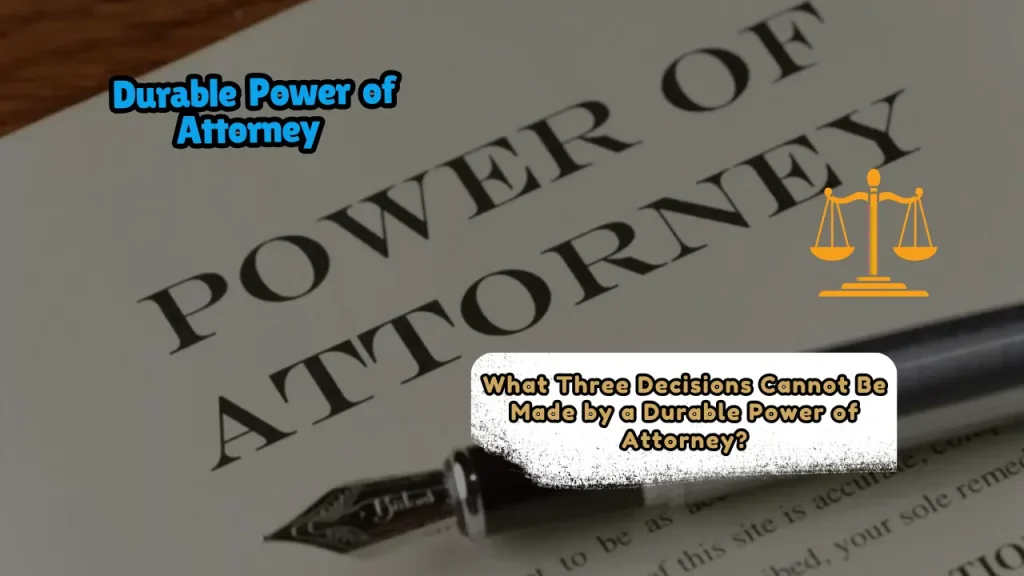What Three Decisions Cannot Be Made by a Durable Power of Attorney?
A Durable Power of Attorney (DPOA) cannot be used to (1) change or revoke your will or handle testamentary decisions, (2) exercise your voting rights, or (3) make personal decisions regarding marriage, divorce, or adoption. These decisions remain strictly your own and are protected by law to ensure your personal autonomy.
Table of Contents
Understanding Durable Power of Attorney
A Durable Power of Attorney is designed to continue functioning even if you become incapacitated. It is a vital part of estate planning that helps maintain continuity in managing your financial and legal matters during emergencies. However, it’s important to remember that a DPOA is not a blanket authorization for all aspects of your life.
Three Decisions That a Durable POA Cannot Make
1. Altering or Revoking Your Will (Testamentary Decisions)
What It Means:
A DPOA does not allow your agent to change, revoke, or amend your will. Testamentary decisions—how your property will be distributed after your death—are your own prerogative and must be handled through a separate process with strict legal guidelines.
Why It Matters:
Your will represents your final wishes, and allowing an agent to modify it could lead to outcomes that do not reflect your true intent. For example, if you plan to leave your assets to your children, a DPOA cannot override that decision or transfer your property to someone else.
2. Exercising Your Voting Rights
What It Means:
Your right to vote is a fundamental personal privilege that remains strictly yours. A Durable POA cannot confer upon your agent the authority to cast your ballot in elections.
Why It Matters:
Voting is an essential component of democratic participation and personal liberty. Delegating this right would undermine the integrity of your personal decision-making power, as no legal document can transfer this intrinsic right to another person.
Related article for you:
3 Surprising Limits of a Financial Power of Attorney: What Your Agent Can’t Decide

3. Making Personal Decisions About Marriage or Divorce
What It Means:
A Durable POA cannot be used to make decisions regarding personal matters such as marriage, divorce, or adoption. These decisions are intimate and require your personal consent and direct involvement.
Why It Matters:
Decisions about marriage and divorce have lasting effects on your personal life and relationships. They are considered non-delegable rights, meaning that even if you become incapacitated, you cannot authorize someone else to decide whether you should marry or divorce. Such personal choices must remain under your own control.
Why These Limitations Exist
These restrictions are in place to protect your core rights and ensure that crucial personal decisions remain with you. Changing your will, voting, or making marital decisions are deeply personal actions that reflect your values, beliefs, and identity. The law safeguards these decisions to prevent abuse or unintended consequences, ensuring that your autonomy is never compromised—even if you grant broad authority through a Durable POA.
FAQs
Can a DPOA change my will after I become incapacitated?
No, a Durable POA does not have the authority to alter, revoke, or modify your will. Testamentary decisions must be made directly by you or through a separate legal process.
Is it possible for my agent to vote on my behalf under a DPOA?
No, the right to vote is a personal and non-delegable right that cannot be transferred through any power of attorney.
Can a DPOA be used to make decisions about my marriage or divorce?
No, a Durable POA does not allow your agent to decide on personal matters such as marriage, divorce, or adoption. These decisions must be made by you directly.
Additional Resources
- American Bar Association: Offers detailed guides on the limits of powers granted by POAs.
- Local Legal Aid and State Resources: Many state government websites provide free POA forms and comprehensive instructions.
- For More Information:
Explore our article What Are the Types of Power of Attorney? How to Pick the Right Type for further insights into choosing the best POA for your needs.
Final Tips
- Keep Critical Decisions Reserved:
Understand that decisions regarding your will, voting, and personal relationships remain exclusively your own. - Review and Update Regularly:
Periodically review your POA documents to ensure they remain current with your wishes and comply with any changes in the law. - Consult an Attorney if Needed:
For complex situations, a short consultation with an estate planning attorney can help prevent potential disputes and ensure your documents are airtight.
Conclusion
A Durable Power of Attorney is a powerful legal tool that can protect your interests during times of incapacity. However, it comes with clear limitations: your agent cannot alter your will, exercise your voting rights, or make personal marital decisions.
These restrictions safeguard your autonomy and ensure that the most critical aspects of your personal life remain under your direct control. By understanding these boundaries and regularly reviewing your legal documents, you can ensure that your estate planning truly reflects your wishes and provides the protection you need.
Disclaimer:
This article is for informational purposes only and does not constitute legal advice. Always consult a qualified attorney for guidance tailored to your specific circumstances.
About the Author

Sarah Klein, JD, is an experienced estate planning attorney who has helped clients with wills, trusts, powers of attorney, and probate matters. At All About Lawyer, she simplifies complex estate laws so families can protect their assets, plan ahead, and avoid legal headaches during life’s most sensitive moments.
Read more about Sarah
